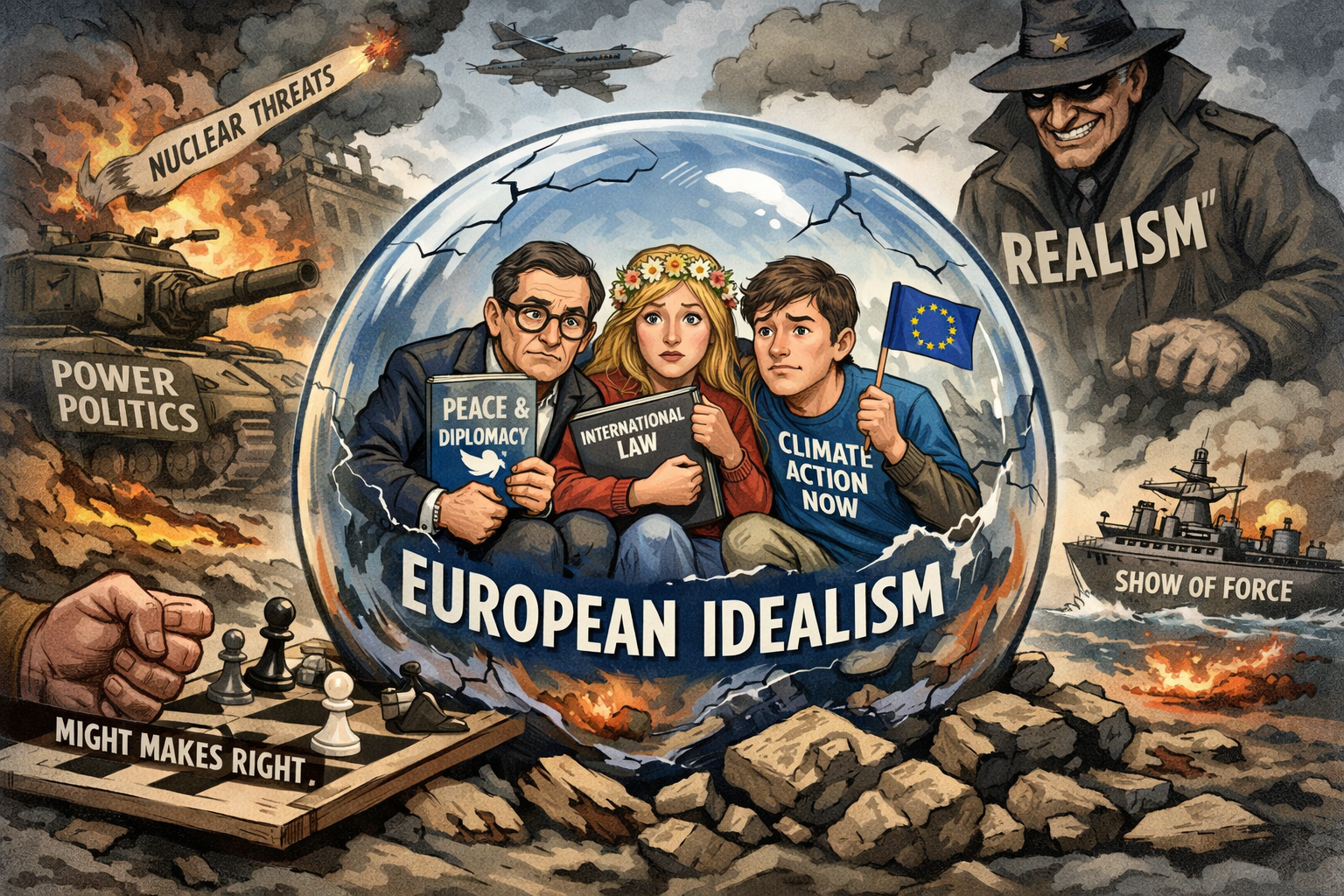The American Interest, Published on: June 21, 2017
What the loss of a Chief of Staff means for the Brexit negotiations.
The Brexit negotiation, whatever else it is, is a political drama of the score-settling type. So let’s imagine it, focusing on a crucial subset of the dramatis personae, as if it were a play about a game whose congealing theme is: What should it cost to leave the European Union?
Shortly into Act One, Theresa May invites Jean-Claude Juncker for dinner at 10 Downing Street. Afterward they stand before the media and agree that the meeting has been “constructive”—that beautiful catchall synonym that usually stands for other adjectives. The following day, the EU delegation’s minutes are leaked to the German press. “Constructive,” we learn, can apparently also mean “catastrophic.”
The Eurocrat-in-chief concludes that the British leader is “on another planet”. The de facto leader of the European Union, the German Chancellor, warns the Bundestag a few days later against the specific dangers of being on another planet.
Theresa May responds in parliament by accusing the EU leadership of attempting to influence the British election with its leaks—Russian parallel very much intended. Angela Merkel then reprimands the Commission’s incontinence. And so the score is even between the most powerful leaders you probably never heard of: Martin Selmayr and Nick Timothy.
Niccolò Machiavelli’s The Prince (1513) was a job application. The unemployed Florentine wanted to show his prowess at using the lamentable realities of the world for the benefit of the necessary. A better title for the book might have been He Who Would Be Counselor, for the book is really written for those who clear the path for the leader.
Machiavelli was willing to say what everyone who did such things for a living already knew very well in the early 16th century: That, occasionally, regime considerations necessitate actions that are seen as immoral from the perspective of individual ethics and community values. This is because there will always be those looking to derail the leader’s political project, and good leaders will be opposed as well as bad ones. This is as true in Western democracies in 2017 as it was in the city-states of medieval Italy.
Behind a great leader stands therefore an often-formidable chief of staff. Shortly after she was deposed, Margaret Thatcher’s confidante, Alistair McAlpine, wrote a textbook on the Machiavellian skill set for use in modern democracies. The Servant (1992) outlines the key tasks of the chief of staff: keep support troops in line; keep tabs on missteps; collect debts; avenge injustices; and nip insurgencies in the bud.
When the partnership works as intended, the chief of staff complements the leader. The chief of staff focuses on the trees so that the leader can focus on the wood, or vice versa. McAlpine stressed that, since leaders are as prone to human weakness as the rest of us, they need someone to move vigilantly in circles they themselves do not frequent, to know the things they cannot know, and say the thinks they could never say—in short, to be a more ruthless manifestation of themselves.
When the Brexit process began, Selmayr and Timothy were staff chiefs for the two key leaders in the Brexit process. Neither the President of the EU Commission nor the British Prime Minister was born to greatness. Perhaps for that reason, both employed formidable right-hand men who have given their political project shape and content. This applies to both Juncker’s more-power-to-the-union and Theresa May’s blue-collar conservatism.
These two young men were perched on top of their respective centralized bureaucracies, not weighted down with line responsibilities but only that of keeping the leader in and on a line. Selmayr and Timothy thus acquired an opportunity to exert significant power. Both did, for a time. Juncker and May had such confidence in Selmayr and Timothy that the two were seen as their master’s voice. The two men’s fates intersected in Act One of Brexit.
Both young men understood that the Brexit process will have a winner and a loser in the eyes of the relevant constituencies, and that this single question will therefore define the legacy of their respective leaders. Yet as befits a good play, we have here two very different personalities.
Martin Selmayr is a true representative of the competent EU bureaucracy. A lawyer with awe-inspiring knowledge of the Union’s rules and procedures, Selmayr pursues the dream of a united Europe with the same ruthless single-mindedness with which Germans have cultivated other nationalisms before it. His weakness is an inflated ego. Rumors have it that Berlin asked to have him removed after the deliberate leak, but Selmayr survived.
His counterpart, Nick Timothy, is a completely different personality. With rumpled attire and colorful language, Timothy is an atypical representative of the upper strata of British administration. He is not educated at one of the two universities that feed the British central state apparatus. The son of a steelworker, he sees the conservative working class as the Conservative Party’s fountain of strength. Most believe it was he who made Theresa May (who had voted to remain in the European Union) into the chief proponent of Brexit and hence an unexpected Prime Minister.
“It is better to be feared than loved, if you cannot be both,” Machiavelli famously wrote. Timothy and Selmayr, both Machiavellian figures, have relied on fear to inspire respect. They were the ones who ensured that some careers prospered while others languished. Ministers and commissioners alike took their calls with a sinking feeling. Both built their power on access to the leader. Few could spend time alone with the boss without the staff manager’s lingering presence. Yet they, too, are mortal and fallible.
In Act Two, Nick Timothy convinces the Prime Minister to announce fresh elections in order to translate favorable polls into a larger parliamentary majority, strengthening May’s power base and, thereby, her negotiating position with respect to the European Union. Had Shakespeare been writing yet again about some intrigues in Italy, he probably would have built a few lines around fickle fortuna for, alas, on June 8, the Conservatives lost their majority. Amid a haphazard election campaign, the Prime Minister refused to meet the opposition leader for debate, turning her “strong and stable” campaign slogan into a joke.
May seemed weak and insecure: Advantage to Selmayr after gross miscalculation by Timothy.
When the Prime Minister thus wrested defeat out of the jaws of victory, the challengers in the party did not come at her openly. Instead, they demanded Timothy’s head. And in line with McAlpine’s playbook, Timothy fell on his sword, because the servant must defend the leader without reservation. He suffered the consequences so that May would not have to—at least not yet.
A weakened British Prime Minister now faces an uncertain future. British Conservatives are known to conspire against weak leaders, and without Timothy they no longer fear the Prime Minister. As Act Three begins, conspiracies are hatched and knives are sharpened while the Brexit negotiations languish.
DROP CAP
The fate of Nick Timothy offers a glimpse into the Brexit process, which can be understood as part drama, part political bloodsport, in which the relevant bureaucracies will handle the myriad details and lawyers-turned-diplomats will niggle one another over the interpretation of the legal frameworks. But the Brexit process most centrally contains an intense political dimension, a kind of “battle over reality.” What is at stake; what is reasonable; what is important? Why, just by the way, should Britain need to pay anything to leave a relationship?
At the beginning of Act Four, things get off to a bracing start when the EU reportedly demands a hundred billion euros from Britain. Usually one has to lose a major war to be asked for such a sum.
Whoever prevails will do so largely through the ability to set the agenda. The United Kingdom will probably need to split the EU block and build subordinate coalitions in order to prevent the Commission from dominating the agenda. The British challenge is to build a coalition with sufficient gravity to draw in the hold-outs.
The EU’s preferred negotiating mode is one where negotiator Michel Barnier alone speaks on behalf of all 27 member-states. Both Russia and the United States have managed to divide the European Union in the past, however; we should probably assume that British diplomacy is equally competent. If the British do not get into parallel negotiations with different actors, there will likely be no deal, because the sum of accumulated demands on the EU side is, well, 100 billion euro. But in losing Timothy, Theresa May lost her Machiavellian strategist and with him, perhaps, her best chance at dividing the EU and gaining an affordable settlement.
In order for the Commission to retain control of the process, a UK divide and rule strategy must be parried at all costs. The EU leadership sees the Brexit negotiations as a golden opportunity to illustrate the benefits of membership, and the costs of exit, by harrowing the British. The Commission’s problem is that a harsh, punitive settlement is at odds with there being any agreed settlement at all.
If the UK is to get a deal it can stomach, it must likely happen during the first few rounds of negotiations, which means that the Commission should compromise sooner rather than later. But, in keeping with the EU’s almost autistic approach to diplomacy, it probably won’t. If negotiations draw out, French influence will grow, and French expectations of a high payout will strengthen as time passes. If that happens, the Brexit talks will likely fail from the fact that there are simply too many actors with clear expectations and unclear negotiating positions.
If no “big bang” agreement is reached, the alternative looks to be a tangle of limited bilateral arrangements, similar to the current arrangement between Switzerland and the European Union. But while the EU-Swiss relationship came about gradually and without a great deal of enmity, neither condition would apply to a prospective UK relationship with the EU. Act Four could grow very long, and tragic, indeed.
Asle Toje (D.Phil) is Norwegian foreign policy commentator.




